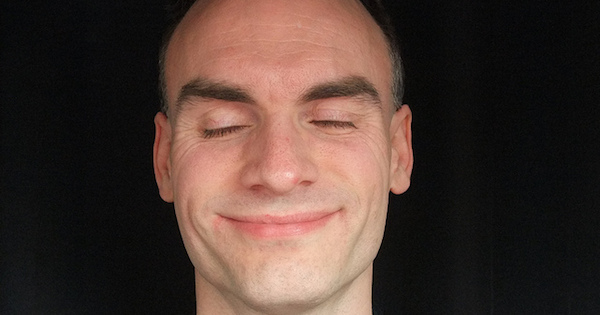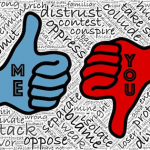
FRANK SCHAEFFER (former Evangelical Christian): Luke, last time you said that you are a Christian because you need hope… really? It this a psychological crutch? Is that a truth claim?
LUKE MOON (Evangelical Christian): Hope is only one thing that faith gives. The belief in a transcendent God means that there is not just hope, but ethics and purpose too. I don’t see these things as a crutch, but a holistic view of reality.
I’ve mentioned before, I didn’t come to faith because of tragedy in my life or some injustice. It was very rational for me.
Frank: But does finding hope, ethics and the rest make anything in the Bible true?
Luke: People can claim hope, ethics, etc apart from belief in the Bible. However, the Bible provides a strong meta-narrative into which hope, ethics, purpose can fit. The faith that says that all people are made in the image of God and therefore have inherent value means to me that people are valuable not because of their utility, but because God says they are valuable. I will disagree with you on your ideas and beliefs, but you are more than your ideas and beliefs. You are a man made in the image of God and God expects me to treat you accordingly.
Frank: Lovely, so that is a nice feeling but how does that relate to reality, with or without ethics? And since there is no indication that anyone who believes what you just said actually does anything very different from people who don’t — where does that get anyone? Just because a work of fiction makes you feel better or more meaningful doesn’t make it historically accurate. Just saying…
Luke: It matters to reality in that if there is no transcendent God that offers a universal ethic, then we have no right to say that slavery, the holocaust, or even Aleppo is bad or wrong. Without a universal ethic, every person decides what is right and wrong in their own mind. We trade ethics for power.
Frank: So you said. I’m waiting for anything but this utilitarian argument you are making… the ethics are useful — so what? Does that mean that on the third day, the amino acids rekindled and Jesus came to life… a virgin birth… a six-day creation or even the existence of God? Your utilitarian argument is the humanist one. Science works and makes us feel good so it is right and true. On that basis we could all accept genetic engineering to fix our problems, does the fact it would provide ethics and meaning so to speak mean it is right or true? I find your argument entirely a function of utility not truth.
And to my point: no creeds I ever read list all the useful or good things being a Christian does for you or society… they list stuff you have to say you believe to be as true as water is wet, and falling off 7 story buildings kills you…
Luke: How is this a utilitarian argument? It seems the humanists would say ethics come about through time and chance blah, blah, blah. We don’t murder because we “learned” that murder is bad. The Christian would say that murder is wrong because God said it was wrong. He said it was wrong because we are made in his image.
Frank: Luke, I’m asking you if you believe that anything in the Bible is true in the same way that you know the ocean has water in it? Did it happen? You are repeating yourself. Put it this way: the results of living as if one believed the Bible or Koran is a book of history and science might be great but that doesn’t make it so. D-O …Y-O-U …S-P-E-A-K …E-N-G-L-I-S-H? I’ve said this three ways now, and you just keep repeating yourself, lending some credence to my idea that evangelicals are certainty addicts with tragically altered neural pathways! :- ) Have you snapped, and if so, when did it happen?
Luke: Yes, I believe that the Bible is true in the same way that water is wet. What I’m reluctant to do is to get into an argument over statistics and stories that “prove” it to be true. I find that most people reject Christianity not really because of evolution versus Creation or whatever, but because of something significantly more personal. The beginning and end of the Bible provide a lot of fertile ground for uncertainty addicts to use against the certainty addicts. There are lots of crazies who hang out there. The guy in the middle, the hinge of history, is who Christianity is all about.
…
…
Frank: You’re taking a long time here to answer me … what are you doing, consulting with the editors of Christianity Today magazine?
Luke: No, I got out of my train, got in a car and got driven home. Seriously, folks we are doing this on the fly. I’ll give you the last word this week…
Frank: I’d love it if you were correct… so simple and easy. You aren’t of course, but I see it another way: Faith in anything religious is illogical, emotional, and rooted to need. That said that doesn’t mean there isn’t more to our existence than we can see– let alone may “prove.” I embrace the irrational in many areas of my life. For instance I believe that my love for my wife, children and grandchildren has intrinsic value. I believe beauty has intrinsic value. This is not supported by anything but a hunch. I don’t believe that others who disagree with me on the intrinsic value of love and beauty will burn in hell for eternity because I don’t think God or gods–whatever–are stupider than me (if any). Clearly the Bible is just another book of collected stories… that doesn’t detract from it because so is everything else. You gotta problem with that?
Luke: Ugh. You know I gotta problem with that ;- ) , but you get the last word….
Frank: To be continued…
Schaeffer & Moon is written on the fly in a real-time chat room format and lightly proofed by Patheos editors.
Image by Lee Haywood via Flickr / CC 2.0












